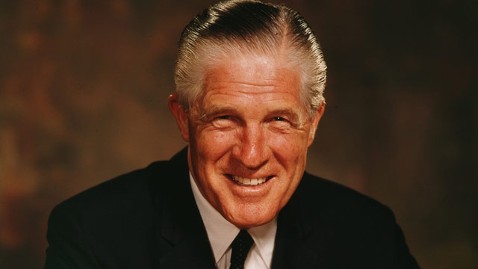How Mitt Romney's Mexican-Born Father Was Eligible to be President

(Image Credit: Bachrach/Getty Images)
Mitt Romney's father, George Romney, has been invoked on the campaign trail often.
Newt Gingrich used his release of 12 years' of tax records as an example to push his rival to release his own tax returns. On Thursday night, Romney mentioned the fact that his father was born in Mexico in response to Gingrich's allegations that he is " anti-immigrant," which raises the question: If George Romney was born in Mexico, how could he run for president?
It is clear that naturalized citizens cannot qualify for the office of president, but there is no clarification in the U.S. Constitution pertaining to people born to U.S. citizens in a foreign country, and there is no definition of a "natural-born citizen." Some experts have challenged the idea that foreign-born children of U.S. citizens are "natural-born" because citizenship is conferred upon them after birth.
A Congressional Research Service report published in November comes closest to answering that question.
"There have been legitimate legal issues raised concerning those born outside of the country to U.S. citizens," the report states. "The weight of legal and historical authority indicates that the term 'natural born' citizen would mean a person who is entitled to U.S. citizenship 'by birth' or 'at birth,' either by being born 'in' the United States and under its jurisdiction, even those born to alien parents; by being born abroad to U.S. citizen-parents; or by being born in other situations meeting legal requirements for U.S. citizenship 'at birth.'"
Romney was born to American citizens living in a Mormon church colony in Chihuahua, Mexico.
Even though he wasn't born in a United States territory or state, George Romney was given citizenship at birth because he was born to American citizens, essentially granting him the status of a natural-born citizen.
"When you're born outside the United States to [U.S.] citizens, you have citizenship at birth," explained Peter J. Spiro, a professor of law and an expert on the law of citizenship at Temple University. "You don't have to do anything to claim your citizenship. You are a citizen from birth."
Romney was the first presidential candidate born outside the United States, and his decision to run against Nixon in the Republican primary of 1968 raised many questions.
"This is not the kind of issue that was decided by the courts," Spiro said. "No court has said definitively, but I think there's some consensus understanding that a person such as George Romney would be eligible to be president."
The issue came to the limelight again in 2008 with both parties' candidates. Sen. John McCain was born on a U.S. naval air station in the Panama Canal Zone when his father was posted there, leading some to question whether he would be eligible for the presidency. It turned out to be a non-issue because a law passed in 1937, and applied retroactively, gave citizenship to anyone born in Panama whose mother or father was a U.S. citizen. President Obama was dogged for much longer by the birther movement about where he was born. The president released his birth certificate as proof that he was born in Hawaii.
Citizenship for foreign-born children of U.S. nationals is not an issue that has gained widespread attention. George Romney didn't make it far enough into the campaign for it to pose a problem, but that's likely to change, Spiro says.
"Going forward, there are likely to be other cases of other individuals who are born out the United States with citizenship, who achieve political prominence and who are in the ballpark for presidency," he said. "This issue is not going to go away."
Several members of Congress - mostly Republicans - have attempted to cement this practice into a bill.
Former Sen. Don Nickles introduced the Natural Born Citizen Act in 2004 to define the term, natural-born citizen, to include people who derived citizenship at birth from a U.S. citizen parent and to children under 18 who were adopted by U.S. citizens.
Sen. Orrin Hatch, R-Utah, went a step further, introducing the Equal Right to Govern Amendment in July 2003 to allow immigrants who had been naturalized for at least 20 years to run for president.